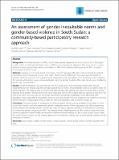| dc.contributor.author | Scott, Jennifer Ann | |
| dc.contributor.author | Averbach, Sarah Helene | |
| dc.contributor.author | Modest, Anna | |
| dc.contributor.author | Hacker, Michele Renee | |
| dc.contributor.author | Cornish, Sarah | |
| dc.contributor.author | Spencer, Danielle | |
| dc.contributor.author | Murphy, Maureen | |
| dc.contributor.author | Parmar, Parveen | |
| dc.date.accessioned | 2013-05-09T17:51:34Z | |
| dc.date.issued | 2013 | |
| dc.identifier.citation | Scott, Jennifer, Sarah Averbach, Anna Merport Modest, Michele R Hacker, Sarah Cornish, Danielle Spencer, Maureen Murphy, and Parveen Parmar. 2013. An assessment of gender inequitable norms and gender-based violence in South Sudan: a community-based participatory research approach. Conflict and Health 7: 4. | en_US |
| dc.identifier.issn | 1752-1505 | en_US |
| dc.identifier.uri | http://nrs.harvard.edu/urn-3:HUL.InstRepos:10613643 | |
| dc.description.abstract | Background: Following decades of conflict, South Sudan gained independence from Sudan in 2011. Prolonged conflict, which included gender-based violence (GBV), exacerbated gender disparities. This study aimed to assess attitudes towards gender inequitable norms related to GBV and to estimate the frequency of GBV in sampled communities of South Sudan. Methods: Applying a community-based participatory research approach, 680 adult male and female household respondents were interviewed in seven sites within South Sudan in 2009–2011. Sites were selected based on program catchment area for a non-governmental organization and respondents were selected by quota sampling. The verbally-administered survey assessed attitudes using the Gender Equitable Men scale. Results were stratified by gender, age, and education. Results: Of 680 respondents, 352 were female, 326 were male, and 2 did not provide gender data. Among respondents, 82% of females and 81% of males agreed that ‘a woman should tolerate violence in order to keep her family together’. The majority, 68% of females and 63% of males, also agreed that ‘there are times when a woman deserves to be beaten’. Women (47%) were more likely than men (37%) to agree that ‘it is okay for a man to hit his wife if she won’t have sex with him’ (p=0.005). Agreement with gender inequitable norms decreased with education. Across sites, 69% of respondents knew at least one woman who was beaten by her husband in the past month and 42% of respondents knew at least one man who forced his wife or partner to have sex. Conclusion: The study reveals an acceptance of violence against women among sampled communities in South Sudan. Both women and men agreed with gender inequitable norms, further supporting that GBV programming should address the attitudes of both women and men. The results support promotion of education as a strategy for addressing gender inequality and GBV. The findings reveal a high frequency of GBV across all assessment sites; however, population-based studies are needed to determine the prevalence of GBV in South Sudan. South Sudan, the world’s newest nation, has the unique opportunity to implement policies that promote gender equality and the protection of women. | en_US |
| dc.language.iso | en_US | en_US |
| dc.publisher | BioMed Central | en_US |
| dc.relation.isversionof | doi:10.1186/1752-1505-7-4 | en_US |
| dc.relation.hasversion | http://www.ncbi.nlm.nih.gov/pmc/articles/PMC3599371/pdf/ | en_US |
| dash.license | LAA | |
| dc.subject | South Sudan | en_US |
| dc.subject | Conflict | en_US |
| dc.subject | Gender norms | en_US |
| dc.subject | Gender equality | en_US |
| dc.subject | Gender-based violence | en_US |
| dc.subject | Gender Equitable Men scale | en_US |
| dc.title | An assessment of gender inequitable norms and gender-based violence in South Sudan: a community-based participatory research approach | en_US |
| dc.type | Journal Article | en_US |
| dc.description.version | Version of Record | en_US |
| dc.relation.journal | Conflict and Health | en_US |
| dash.depositing.author | Hacker, Michele Renee | |
| dc.date.available | 2013-05-09T17:51:34Z | |
| dc.identifier.doi | 10.1186/1752-1505-7-4 | * |
| dash.contributor.affiliated | Averbach, Sarah | |
| dash.contributor.affiliated | Modest, Anna | |
| dash.contributor.affiliated | Scott, Jennifer | |
| dash.contributor.affiliated | Hacker, Michele | |


